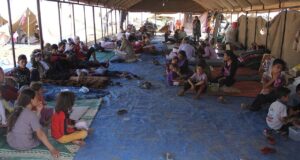By Simon Schofield and Dr Dwayne Menezes
19th March 2014, Global Governance, Issue 1, No. 2.
As declared by Russia Today, Russian troops were deployed to Crimea ‘only to protect human rights’.[1] The Crimean issue unfolding at present was compared to the secession of Kosovo, and daring to deny the illusory similarities between these two wildly different conflicts is described as ‘rewriting the rulebook’ on the Responsibility to Protect (R2P) doctrine.[2]
This is the propaganda emanating from Moscow at present. However, just because Vladimir Putin cynically invoked R2P to give political cover to what is nothing short of poorly veiled expansionism does not mean that Russia’s appalling behaviour at present at all reflects on R2P. All this serves to show is that Russia still looms large as a bellicose aggressor on the world stage.
Now, it is true that many interventions can seem – and may well be – borne out of interest. One might say that this is evident in why the US and the UK intervened in Iraq or Libya, but do not intervene in the Central African Republic and South Sudan. However, it would be naïve to infer on that basis that the world’s most vulnerable peoples would be safer without humanitarian intervention, driven by the Responsibility to Protect (R2P) doctrine, as an option on the table.
Then, even if one establishes for the sake of argument that interventions always proceed from interest, it is not clear how questioning the necessity of the R2P norm itself (rather than the motivations of intervening parties) can arise as the logical response. Instead, would it not be more logical to argue that there must be a well-regulated, interest-blind, uniformly-enforced policy that dictates when intervention is warranted?
Of course, those sceptical about the R2P norm might argue that it lends itself to misuse, allowing the interests of strong states to trump the rights of weaker states. Such an argument would again assume that there were no policies in place to govern the ‘when’ and the ‘why’ of intervention and suggest that countries were free to intervene in the affairs of other countries at will. However, if there is a problem with the international regulation of humanitarian intervention, is it not regulatory excess rather than the lack thereof that lies at its heart, as is evident in Syria?
The R2P norm clearly outlines the circumstances in which intervention is available as an option. While the first pillar on which it rests holds that states are obliged to protect their populations from mass atrocity crimes (genocide, crimes against humanity, war crimes and ethnic cleansing), its two other pillars hold that the international community has a responsibility to assist the state in fulfilling its responsibility and, if necessary, to employ coercive measures when states have failed to protect their citizens as stipulated. Even then, military intervention is seen to be a last resort[3].
Furthermore, the flawed line of logic also assumes that states have more rights than peoples. What R2P recognises is that strong states can not only impose their will on weaker states, but also on their own weak citizenry, who make easy prey for well-equipped and well-trained state security forces. When the state apparatus put in place to deter foreign invaders and domestic criminals is turned against vulnerable citizens, there can be little defence that the citizenry themselves can rally.
To ensure such a scenario does not unfold, R2P safeguards the rights of all people by adding a caveat to state power: that sovereignty is conditional on the maintenance of human rights. Where a state willfully ignores or fails to live up to its responsibility to protect, the international community is expected to take up that responsibility on behalf of the vulnerable.
 Human Security Centre Human Rights and International Security Research
Human Security Centre Human Rights and International Security Research



